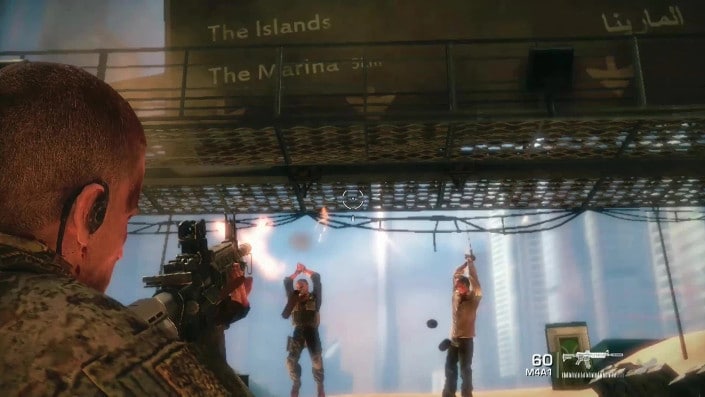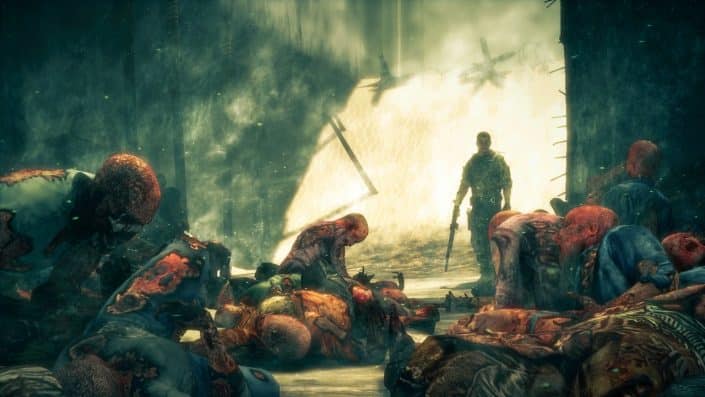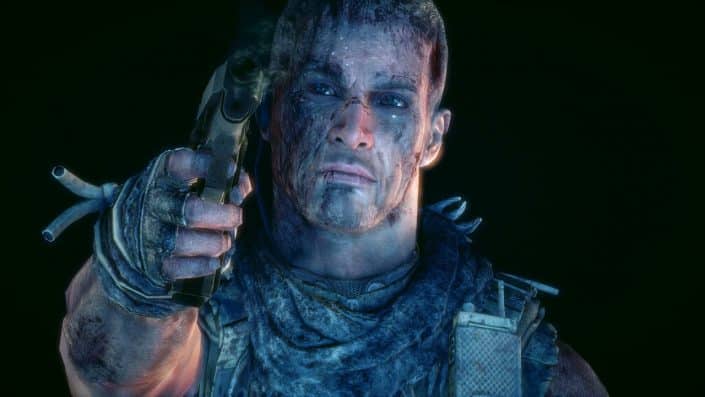Exactly ten years ago today, “Spec Ops: The Line” was released, a game that flew under the radar for a long time. At first glance, it was just another third-person shooter in which the player takes the role of a US soldier in a new battle. What actually distinguished the title and ultimately turned the former insider tip into a cult game was its story, which is an unforgettable experience even after a decade.
More than just another generic third-person shooter
We take control of Captain Martin Walker, who has been deployed to Dubai along with two fellow Delta Forces. An entire renegade battalion of the United States Army is said to have holed up there under the command of Colonel John Konrad. While the trio initially believe they can get the situation under control, they quickly realize that the city has turned into a war zone and nothing is the same as it used to be.
First, Walker and his team have to defend themselves against locals, but the further they advance into the center of the metropolis, the more their previous view of the world is turned upside down. Suddenly, US soldiers open fire on them and both the main characters and the player begin a steady fall into the darkness, right into the heart of darkness. Welcome to hell, Walker.
For the first few hours of play, yes, Spec Ops: The Line really feels like just one of many military shooters released back then. The gameplay, which above all made great use of its cover mechanics, was already known from other titles of the time, such as a “Gears of War” or an “Uncharted”. In addition, the tactical possibilities and the commands that Walker was able to give his team, for example in comparison to “Ghost Recon: Modern Warfighter 2”, seemed very rudimentary and limited.
All of these components served a purpose, however, and that’s exactly what development studio Yager Development intended, as the team skillfully plays with players’ perceptions to pull them deeper into the story. The story of the game is often mentioned in the same breath with other great titles like “BioShock”, “Metal Gear Solid 3: Snake Eater” or “The Last of Us”. All these games are particularly praised for their stories that stick in the memory long after the credits have rolled, but it was a long road for the German shooter to get there.
Moral Dilemmas: There’s only bad or worse
One reason why “Spec Ops: The Line” was able to do this successfully was the decision options that were repeatedly thrown into the gameplay. In some scenes, these options were very obvious, such as when Walker is asked to shoot one of two men. Other scenes deal with it more subtly and in still others the player may not even realize at first glance that he can make a choice here.

The title also regularly works cleverly with moral questions that are intended to make the player think. It is also a trick that is often used in today’s games, especially in connection with different decision options that can influence the further course of action. These effects on the overarching framework story are often rather manageable in the third-person shooter, but many of these moments are remembered because there is often no clear distinction between black and white. Instead, the only choice left is between bad or worse.
This, in turn, strengthens the player’s bond with Walker, who is increasingly caught in a downward spiral and pulled down into the depths. At first the changes in the character only appear to be of an external nature: The uniform, which was initially clean, becomes more and more dirty and takes on significant damage over the course of the journey. However, the psychological changes in Walker are becoming more and more noticeable: his tone with his team is becoming rougher, his melee attacks more brutal and his perception seems to be playing tricks on him (and the player) again and again.
Do you feel like a hero, Walker?
Yager creates a distinct feeling of uneasiness that steadily increases as Spec Ops: The Line progresses. In addition, in contrast to many other shooters, those responsible regularly confront the player with the consequences of his actions. For most players, the white phosphorus sequence is probably the one that is most likely to be burned into their minds. Walker and his comrades use the ferocious weapon to target what appear to be enemy soldiers, but in the end end up taking the lives of scores of refugees seeking shelter.

It’s at moments like these that the game is furthest away from other military shooters like Call of Duty or Battlefield. The first-person shooter hit from Activision Blizzard also tried to paint a more realistic picture of the war with the restart of the “Modern Warfare” series, but it only scratches the surface. “The Line”, on the other hand, shows on various levels that war is hell.
This is made clear by means of a character study of a man who initially still believes in his mission before he increasingly loses himself in his own darkness. There are also numerous allusions to all possible levels of the game, be it supposedly small details in the areas, in the gameplay, the course of the story up to the loading screens and the start screen. Spec Ops: The Line is an anti-war game through and through.
Spec Ops: The Line thrives on its scope for interpretation
The fact that all these facets leave such a lasting impression is mainly due to the fact that Yager Development does not point the finger at the player and pretend what is morally right or wrong. Instead, there is enormous freedom of interpretation of many scenes, which, among other things, has fueled numerous fan theories over the past ten years. For example, one assumes that Walker dies in the prologue of the game and everything that we subsequently experience with him in the game is just a kind of flashback. “That’s an absolutely valid interpretation,” Yager’s Timo Ullmann told us in an interview.

But that’s just the tip of the iceberg, because various other scenes from “Spec Ops: The Line” can be interpreted in a similar way. For example, does Walker actually find himself in Hell in the latter parts of the game? Are all events possibly an expression of his feelings of guilt, which he was never able to process during his lifetime? Perhaps he refuses to take responsibility for his actions while he was alive and is therefore tortured by his mistakes? Even after ten years, this wide scope for interpretation still accounts for an enormous part of the fascination of the game.
Whether it’s 2012 or 2022, Walker’s journey into the heart of darkness remains an immensely gripping tour de force into the abysses of human nature and the battered psyche of a deeply broken man. Spec Ops: The Line didn’t really shine until after its release, but with its deep story and complex main character, it’s still an unforgettable experience ten years later.
What memories do you associate with “Spec Ops: The Line”?
More news on Spec Ops: The Line.
Discuss this news on the PlayStation Forum
Links to Amazon, Media Markt, Saturn and some other retailers are usually affiliate links. If you make a purchase, we receive a small commission that we can use to finance the free-to-use site. You have no disadvantages.
The post Ten years later it was still an unforgettable experience appeared first on Gamingsym.
